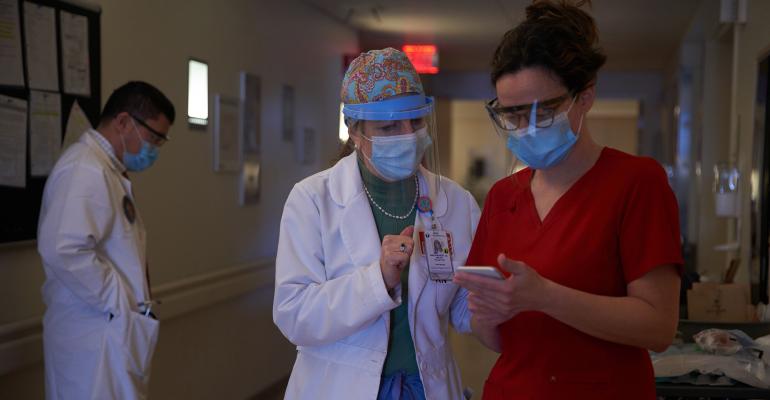(Bloomberg) -- The network of hospitals, prestigious universities and prep schools that has propelled New England’s regional economic growth for decades is dragging the recovery in its labor market and fueling historically high unemployment.
After decades sustaining a jobless rate below that of the country as a whole, New England now stands above the U.S. average. Its rate was 5% in November, the most recent month for which historical comparisons can be made, against 4.2% for the national figure.
Roughly a third of the decline in payrolls in Massachusetts -- the region’s economic engine -- and Rhode Island is accounted for by slumps in the health and education services industries, according to the Bureau of Labor Statistics. For the U.S. as a whole, that ratio is just 20%.
Workers in people-facing roles at locations including hospitals and schools are often too young to retire, and are now looking for positions with less risk toward Covid-19. It’s causing a churn in the labor force that’s forcing employers to boost pay, training and other benefits to lure the wary.
“Those roles felt very dangerous and precarious during the pandemic,” Mandy Townsend, vice president of employer engagement at Jewish Vocational Service Boston, said of positions such as patient-care and pharmacy technician jobs. The problem: “Remote work is really such a small margin of the work available.”
Townsend is seeing a much more demanding approach from those looking for work than was the case prior to Covid-19, with workers less willing to accept conditions they see as risky.
“We have people start jobs, and then ghost their jobs in the first week,” said Townsend, whose nonprofit agency works with about 500 employers and 12,000 to 16,000 job seekers. “It’s frustrating.”
JVS-Boston, which works to match, and coach, job seekers and employers, has responded with what it calls “the Ghostbuster Project,” to find out exactly why there’s so much turnover. That’s involved paying people to be frank about their reasons, she added.
“What we’re hearing from people is, if the work environment on day-one is not supportive and what they were really expecting during their training and during their job-search process, they feel no connection to it, and they’ll just leave,” she said.
Rose Sheehan has seen the upsurge in job leavers first-hand as chief human resources officer for Mass General Brigham -- the biggest private employer in Massachusetts. Her Boston-based nonprofit health system has seen the staff vacancy rate jump to 9.5% from 7% just a year ago, and now has some 8,000 job openings -- up from less than 6,500 on the eve of the pandemic.
The biggest age group that’s leaving: millennials, Sheehan says. “They’re clearly not retiring -- but choosing to do other things.” About 50% of those leaving work say it’s for another job, Sheehan says.
In time, some in the job market will likely be pushed into roles even if they’re not a perfect fit, as pandemic assistance from the government runs down.
Dan Tucker, a 56-year-old from Marblehead, Massachusetts, lost his previous role running the North American operations for a British maker of racing sailboats on the eve of the pandemic. In his search for the ideal role -- a position running a small business -- he’s made use of pandemic-relief assistance provided by the government.
But, with the exception of health insurance, the aid has run out, he said.
“Watching the bank balance shrink every month as I pay my rent and buy groceries has been increasingly motivating,” Tucker said. “I’m questioning whether I need to hang on for what I want to do, or take something that isn’t really what I want to do,” he said. “I need to rebuild my savings, and I need to build my retirement.”
Such determination to keep at it is one reason regional unemployment rates are lingering higher. More people are jobless because more people are looking for work: There’s been less of an exodus in the Massachusetts and Rhode Island workforces than has been the case nationally.
“It is certainly a silver lining,” said Jeffrey Thompson, an economist and director of the New England Public Policy Center at the Federal Reserve Bank of Boston, earlier this month. “It’s a little bit of a momentous statement to make, that ‘I have left the labor force.’” But in Massachusetts and Rhode Island, “they’re not giving up, they’re not ready to retire.”
© 2022 Bloomberg L.P.





